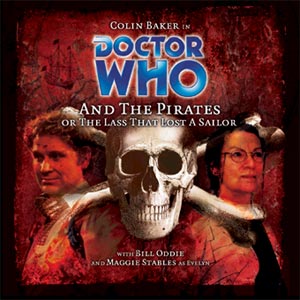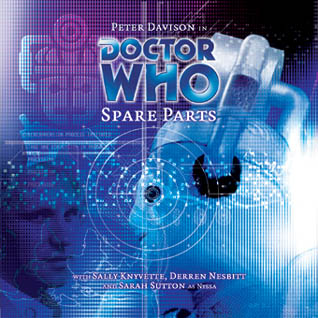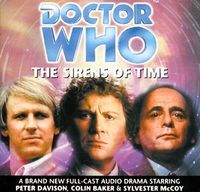Doctor Who and The Pirates
In the 1960s, as Patrick Troughton's era drew to a close, Doctor Who faced The Space Pirates. By the 2000s it was Internet pirates who posed a threat to the Doctor's adventures. Audio drama producers Big Finish have found their officially licenced Doctor Who stories leaking onto peer-to-peer file-sharing networks. To help combat this, they've launched their own legal download service. I spoke to Paul Wilson from Big Finish about the 'battlefield' they face.
A little while ago I was researching a piece for currybetdotnet, and searching Google for some information on cult 70s sci-fi show "The Tomorrow People". I was surprised to see, amongst the results, a torrent file of one of the Big Finish Productions audio dramatisations continuing the series.

In theory I know that everything digital under the sun can be downloaded via peer-to-peer networks. However, it hadn't occurred to me that devoted fans of fantasy and sci-fi would carefully package up and re-distribute productions from the one small company that had been keeping their favourite shows alive on CD.
I wanted to find out more about how a small audio drama business like Big Finish felt it had been affected by the rise of file-sharing and I was lucky enough to get the chance to talk to Paul Wilson. Paul joined Big Finish around six months ago, specifically with the remit to deliver a long-awaited legal download service for their products. Prior to that he had been involved in Doctor Who podcasting.
On their website Big Finish state that:
"Big Finish is happy for you to burn your downloads to CD or to upload your CDs to your personal MP3 player, but please remember that giving those CDs to third parties, exchanging MP3s with friends or posting them on web sites is an infringement of international copyright and could be subject to a criminal prosecution. Big Finish loses around three-quarters of its potential revenue to piracy."
I asked Paul the extent to which the company monitored what was going on with their releases in the p2p sphere. He said that they had been very pro-active in keeping an eye on what was happening with their releases online, but that the company policy was "not to act like hounds" but to "appeal to people's better nature".
In fact, he said, people from the company have even gone onto torrent sites leaving comments to basically say 'Thanks for the interest in our CD, maybe you would consider supporting our production costs by purchasing one'.
Paul believed that there were three types of Big Finish consumer.
At one end of the spectrum was the faithful completist, who would always buy everything legitimately. At the other extreme are people who are never going to pay for any Big Finish products, and may simply be downloading them just because they are there.
It is the middle group of consumers that the company's anti-piracy efforts are aimed at. These are the people they believe sometimes download from peer-to-peer networks, but who might make a purchase if the pricing suited them better, or the audio plays were available in the right formats for them.
I asked why the company had chosen to sell the downloads through their own site rather than partner with iTunes or Audible or another third party. Paul explained that he thought it had been very important for Big Finish to own their own platform.
Firstly it gives them complete control over the pricing mechanism. As the record industry found out, Apple like to sell things on iTunes on Apple's terms, not on the terms of the content producer. Big Finish have a flexible pricing model on the site.
Some stories have individual episodes available to download individually for 99p. Then, if the listener has liked what they heard, they can go on to purchase the full play with a correspondingly reduced price. From the beginning of March users can buy online subscriptions, entitling them to download 6 or 12 months worth of material from a series as it becomes available.
Owning the download platform also meant that Big Finish had control of the end-to-end 'quality' of the download experience, which was important to them. It also allows the company to launch releases which I can only think are aimed at the longest part of the long tail. They are planning a series of download only compilation albums of the best bits from the soundtracks to the audio plays. This must be a very niche market, but of course, with digital as the distribution medium, the albums can be packaged without any up-front physical production costs.
The downloads come in mp3 files encoded at 160kbps, and I asked whether the company had considered employing any DRM mechanisms. Paul was very strongly against implementations of DRM, saying that it 'fundamentally breaks things. If people buy a CD they have a right to play it in any CD player they own'. He didn't see why downloads should be any different, and thought people should be able to move their purchase around whatever devices they own.
Paul also cast a great deal of doubt on how effective DRM is in the fight against piracy. He said that the only argument for having DRM was to lock-down content, but since Big Finish were also issuing the content on CD, it was trivial for someone to rip and upload the CD version. Why, then, worry with the hassle of DRM on the digitally distributed copies?
Which wasn't to say that there had been no internal debate in the company about the potential use of DRM on their products, but it had become evident that any benefits of using such a system were negligible to them as a business.
Big Finish launched their download platform at the beginning of this year, and the majority of their catalogue is available online. There are some gaps though. The original contracts people signed when the plays were produced made no provision for digital distribution. I guess that is a slight faux pas for a series devoted to time travel and visiting the future.
New agreements have had to be sought in a complex rights environment. For Big Finish productions, the rights-holders don't just include the scriptwriter and the cast. The BBC has a stake as the owner of the Doctor Who brand, and all the plays feature original music, meaning that composers also need to consent to the download proposition.
And finally there are the monsters.
Although the format of Doctor Who and the TARDIS are the copyright of the BBC, many well-known villains from the TV series 'belong' to the people who first created them. Big Finish have made adventures featuring Daleks, Cybermen, Ice Warriors and even The Nimon, amongst others, and their appearances have to be agreed with their creators.
Paul believed that the gaps in the catalogue at the moment were mainly due to the slow issue, return, or processing of contracts, and that everything would be available in due course. I hope so. It would be a shame if, like the Target novelisations of the original TV series, a few titles didn't appear in the new format because agreement couldn't be reached with the original writer. [1]
At the same time, another new download initiative from Big Finish this year has been the launch of their podcast. They've previously given away an irregular 'magazine' disc free with some CDs, but the podcast takes this type of content beyond their existing subscriber base for the first time.

They've set a fast pace with a weekly release schedule, and had already picked up a couple of thousand subscribers after just the first couple of episodes. Executive Producer Nick Briggs directly addressed some of the download piracy issues in the first podcast episode. He was keen to stress the regional pricing of the downloads, with US based visitors to the site getting downloads for $12.99 - a lot cheaper than the UK equivalent price of £12.99. He said:
"Over the past few years, because of the exchange rate and the costs of international shipping of goods, our overseas customers, particularly those in the US, have had to pay what we've always thought was an unfairly high price for our CDs, and kind of understandably that's meant that a large number of overseas customers have either stopped listening to our productions altogether, or have resorted to illegally downloading from websites that some people have illegally uploaded our productions to. Well, I won't dwell on that."
Nick went on to explain the price differential for UK and overseas customers.
"£12.99 is, we believe, a good and fair price in the UK. Unlike many other kinds of productions you'll find for sale on CD, DVD or download, Big Finish productions haven't been paid for by other means. They haven't been paid for by a radio station, a TV company or a film company. They are paid for by you. Every penny or cent you pay when you buy a Big Finish audio pays for making the production and distributing it. It pays the actors, the directors, the writers, the sound designers, the musicians. It pays for the rights to the concepts and characters, and it also pays for the studios, the website, the printing and the postage & packing. And that's why we are grateful for all your support, both in the UK and overseas.
As a small company run by enthusiast we are completely at the mercy of the global economy. There is nothing we can do to change it, and as our experience with CD sales to the US has shown us, if we try to charge a dollar price which equals the sterling price, then US listeners will, not surprisingly, feel 'This is too expensive, I can't buy it'. So at least by setting a lower price for the US, one that compares relatively favourably with the retail price of other CDs or downloads in the US market, we may encourage sales that make some revenue, that can help pay for the productions. The pre-download situation, with the overly high price of Big Finish CDs in the US market, means that we make virtually nothing at all from US sales. Our aims are to ensure that the future of our productions is secure."
Briggs spoke of the company's intention to "modify and adapt this service to our listener's needs a time goes by". Since launch the site has already seen the introduction of better account management, with the initial release lacking in signing out and password changing facilities. According to Paul Wilson in the second Big Finish podcast, they are planning to add forums onto the site. I hope they have a good budget for moderation, as the old BBCi Doctor Who forums could be a vicious place, attracting more than its fair share of trolls.
With Big Finish expanding their presence on the web to include downloads, podcasts and a blog, I spoke to Paul a little about the whole 'internet world' that the BBC has created online. The new series has seen Doctor Who related sites for entities from TV like 'Bad Wolf', Geocomtex and UNIT. I wondered if there was much scope for Big Finish to innovate in this way.
They have had domain names in the past for ranges like the Bernice Summerfield adventures, but not specific mini-sites. Paul stressed that for Big Finish it isn't as simple as saying 'Put up a website for this or that', because everything has to be done hand-in-hand with the Licence partner. He also said that the overall Big Finish brand was very important for the company.
My assumption is that the mainstay of the Big Finish revenue stream has been the monthly series of 'classic' Doctor Who audio plays that they have been producing since the release of "The Sirens Of Time" in 1999.
Although I'm sure the repeat broadcast commissions from BBC7 for new series of adventures featuring 8th Doctor Paul McGann can't be hurting either.
However, the revenue model they work on has changed a lot since the late 1990s. File-sharing networks were in their early days then, with Napster starting in 1999 and only getting going in the early 2000s. Now Big Finish see their potential sales eaten away by a much-more widespread use of broadband and peer-to-peer networks in the UK, plus the rival attraction of brand new Doctor Who on the telly.
Very often the debate about piracy and lost revenue is framed in terms of the theoretical losses incurred by major artists and major multi-national labels. Most people don't care whether Jennifer Lopez will be able to have the right colour roses put in her dressing room next time.

In fact, the actions of the likes of the RIAA in America have done nothing to put the average consumer on the side of the big businesses involved.
However, for a company like Big Finish the situation is very different. Despite the huge success of Doctor Who on television, they have a niche audience for CDs featuring new adventures with old Doctors. That audience is made up of hardcore fans, and so I still find it really surprising that there are several different torrents available of each new monthly release as soon as it hits the streets.
I still can't quite get my head around the mentality of a fan who is so passionate about Doctor Who that they are keen enough to purchase an audio play, yet are happy to upload a torrent because they don't seem to care if the actors involved lose royalties, and whether the company funding the plays is making enough money to keep on producing them.
Anyway, on a lighter note, I believe that it is obligatory when interviewing anyone about Doctor Who to ask them who their favourite Doctor is. I've certainly seen Peter Salmon try to get an answer to that question from Julie Gardner. However, since we were talking about internet piracy, I thought I'd put a twist on it and ask who Paul's favourite Doctor Who villain was.
He grew up in Australia watching re-runs of the Pertwee and Tom Baker era alongside imported episodes of The Goodies and Grange Hill, and made a slightly obscure, but excellent choice. He picked Mr Sin, the creepy ventriloquist-doll-assassin from Tom Baker's Victorian era tour de force "The Talons of Weng Chiang". I also remember being terrified by him as a child, and looking at him again as a grown-up, I still have to say, who wouldn't be?

“Who’s Who? The Resurrection of the Doctor” charts how the Guardian has covered Doctor Who since it was revived in 2005. If features interviews with Christopher Eccleston, David Tennant, Matt Smith and the men in charge of the show's fortunes: Russell T. Davies and Steven Moffat. It also includes interviews with a host of other Doctor Who actors including Billie Piper, Freema Agyeman, John Barrowman and writers including Neil Gaiman and Mark Gatiss. There are contributions from legendary author Michael Moorcock, Seventh Doctor Sylvester McCoy, and specially commissioned illustrations from Jamie Lenman.
“Who’s Who? The Resurrection of the Doctor” - £2.99 for Kindle & iBooks.
[1] Notably none of the stories written or co-written by Douglas Adams ever appeared as Target books, as he and the publishers could never agree on who would re-work them into the print versions. [Return to article]





0_o people actually "pay" to see old "Dr Who" shows. If I got nothing better to do, I can still see them on PBS (only if the other channels are loaded with sports, political shows or info mercials. I wouldn't watch it normally)